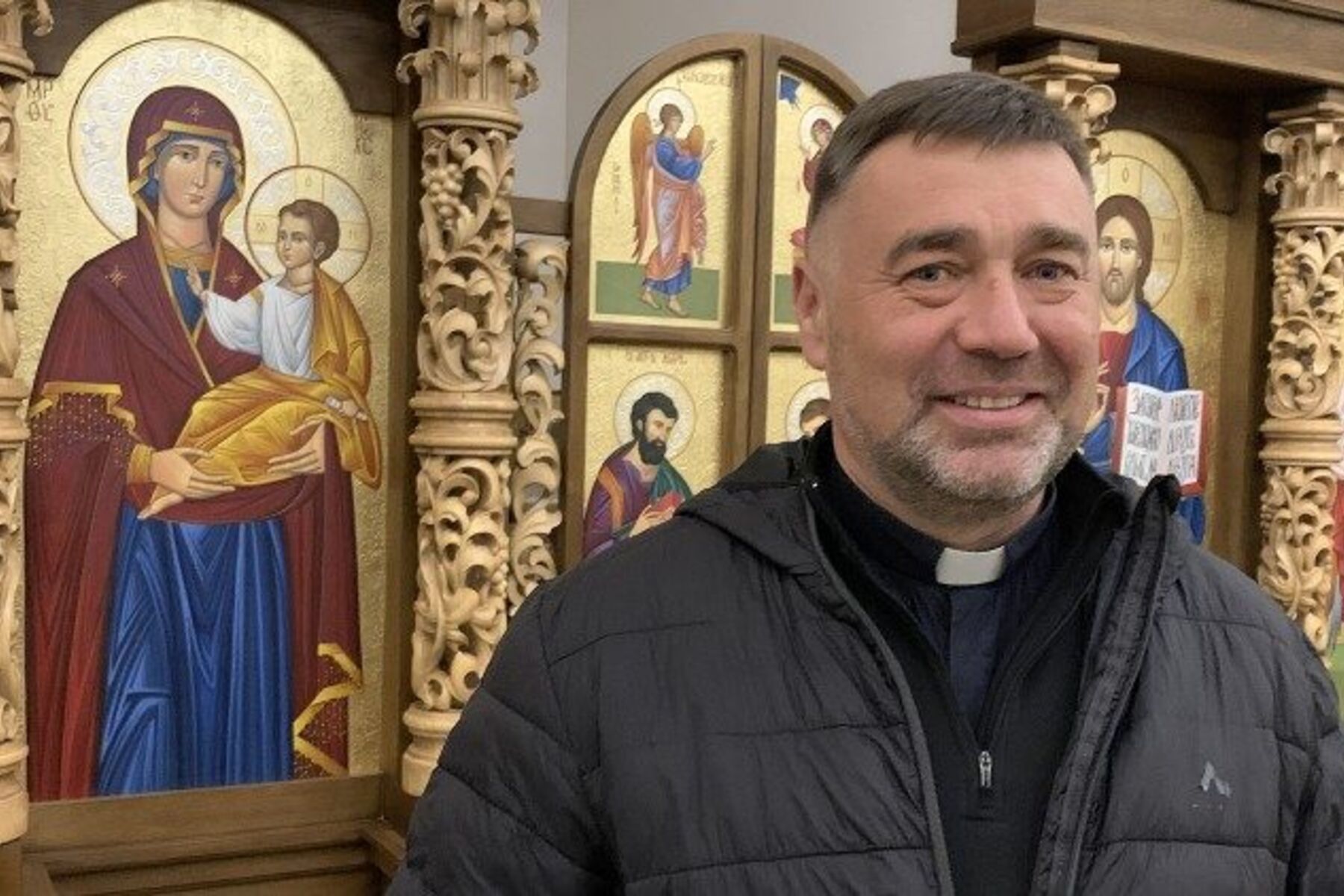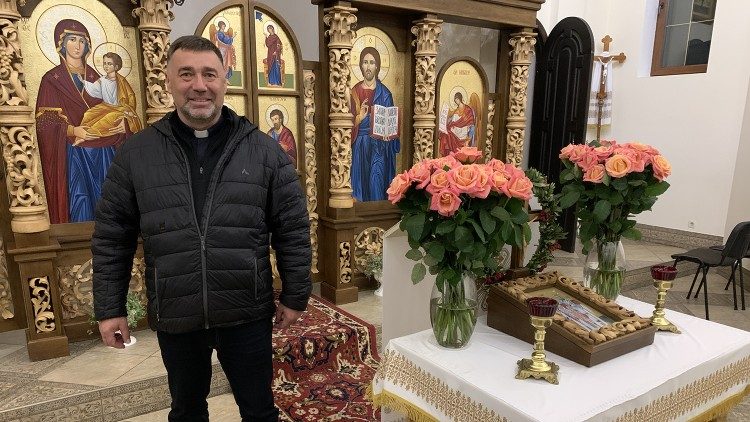Father Oleh Panchyniak: My entire people bear this cross and follow Jesus Christ
December 3, 2023
Since the beginning of Russia’s full-scale invasion of Ukraine, the pastor of the UGCC community in Brovary, Kyiv suburb, has not left his parish. The father of three children, one of whom is at the front lines, tirelessly fulfils his pastoral ministry, and at the same time, provides humanitarian aid to the most vulnerable and displaced.

The interview with Fr. Oleh was recorded by the editor of the French edition of Vatican News, Xavier Sartre, who recently visited Ukraine.
The following is the quoted text: https://www.vaticannews.va/en/church/news/2023–12/ukraine-greek-catholic-priest-father-oleh-mudra-sprava.html
The van bearing the colors of Mudra Sprava (“Wise Cause”), a charitable foundation of the Patriarchal Curia of the Ukrainian Greek Catholic Church, travels through the streets of Brovary, a suburb east of Kyiv.
At the wheel is Father Oleh Panchyniak, the pastor of the Greek Catholic Parish of the Three Holy Hierarchs. With a round, smiling face and a salt-and-pepper beard, he distributes up to a thousand hot meals prepared by Mudra Sprava’s chefs twice a week to five social centers in the municipality and a center for displaced people from the regions of the East occupied by the Russian army.
Offering smiles and handshakes, inquiring about everyone’s well-being, especially the elderly who are cared for 24/7 in communal centers, Father Oleh is an essential figure for the well-being of souls and bodies in this suburb of the capital.
His church, recently built amid apartment blocks, is, as often happens in Ukraine, a house of God, a place of listening and welcome. It has also become a shelter from Russian bombardments for the neighborhood residents.
Father Oleh, like most Greek Catholic priests, is married and a father, with three sons. The eldest, Andriy, has just completed his studies at the seminary. The other two are 24-year-old twins.
Oleh is a captain in the Ukrainian army, an instructor in Lviv. The second, Nazar, has been called to military service and is currently on the eastern front.
For Father Oleh, it’s heart-wrenching. A man of God but also a family man, how does he experience this separation, and how does this trial change his relationship with God or his way of living the Gospel?
We met him in his church in Brovary after one of his rounds, and he granted us the following interview:

Q: How do you feel as a father?
I would like to share a recent experience. I just returned from visiting one of my sons, the one fighting on the front, as the other is a career military officer serving in Lviv.
The most challenging moment of my trip to the front to see my son, named Nazar, was when we said goodbye. I could see that I was leaving hell, and he was staying.
I wished it were the opposite: I wanted to put him in the car and stay where he was. That was the most challenging moment of the journey.
Q: How do you feel as a priest?
Recently, my son gave an interview, and as a father and priest, I was struck when I read his words: “For me, God was there before the war, He is there in the war, and He will be there after the war.”
When I read these words, I thought someone might have tampered with the interview, but when I asked those who conducted it, they said those were his authentic words.
Nazar lost a friend on the front, named Andriy. They trained together in the city of Rivne. In fact, my son was supposed to participate in the mission during which Andriy was killed. What happened is that Andriy replaced him, and that guy died.
Nazar constantly calls me from the front and says, “Dad, remember that you have a fourth son for whom you must pray as much as for us.”
So, I am grateful to God, I pray for Him to watch over my sons and all His sons, and I am grateful that they remember Him.
Q: What message do you convey as a priest?
One of my greatest wishes is for my son to return from the front as a genuine human being. He didn’t go there to kill someone but to protect.
Unfortunately, he has already been to the front line and had to open fire, shoot people. When he came to visit me for two or three days, we sat down, and he said, “Dad, I did it, I shot someone,” and I replied, “My son, you took care of your mother, our country, and everyone who lives here.”
So, my greatest wish is for these children to return as human beings, like the ones I taught them to be before the war.
Fifteen days ago, we celebrated my wife’s 50th birthday, and we didn’t want to have a party. Before that, Nazar called and said, “Mom, I want you to have a party because I went to war so that you could be happy.”
Q: Does this personal experience change your preaching?
Certainly, I have read the Gospels, and as a priest, I had to learn by reading Gospel commentaries. Now, the comments come naturally.
For example, the verse “Whoever does not take up their cross and follow me is not worthy of me” was obvious; I could explain it according to the Church Fathers, according to the teaching of the Apostolic See, but now it has become relevant to me because my entire people bear this cross and follow Jesus Christ.
I meet many soldiers because we send them aid, and all they ask is, “Pray for us. We will come back, and we will pray together.” In other words, the Gospel has become absolutely alive, and these words of Jesus Christ, spoken two thousand years ago, are current and powerful; they provide support to our youth and our faithful.
An essential part of our preaching is how we help the poor throughout the Archeparchy of Kyiv. This aid and the social service provided by the Church are a living sermon and an incarnation of the teachings of the Lord Jesus Christ.
We are now in a place where, when the war broke out, sixty people stayed behind. They had no one, no escape. These were elderly people living in the neighbourhood. There were 60 of us, and we prayed together. They were grateful to God for being able to find refuge in the church when they were bombed.
Q: Has the war changed the relationships between them and you?
I am very happy to have stayed here. Almost all my parishioners left the city at the beginning of the war, and there were practically only five to ten left here. On Sundays, I celebrated the liturgy with two people from the parish and ten to fifteen others who came, those who slept here.
When people started coming back, they began to look at me in a completely different way. There is no need to explain so much; Holy Scripture says it best: “I will strike the shepherd, and the sheep of the flock will be scattered.”
And when you remained faithful to them, they understand that you proclaimed the Gospel to them not because you read it but because you believe in it and it is in your heart. And I see their attitude towards me.
I am not a perfect person; I sometimes get angry, and I can be tough on them. But they love me because I love them, and I want only one thing: that we all be in the Heavenly Kingdom with Jesus.
Q: Is it easy to move forward every day?
I have the opportunity to compare the service I did in a parish in Lviv, where I was a simple “ritual performer,” and the real service here, in the Archeparchy of Kyiv.
With the outbreak of the war, another phase began. Human miseries and pains compel you to act. And you know, when I talk to volunteers, they tell me they act on behalf of victory, that they act because they want to prove that there is good in the world.
That is also my motivation, but there is something else: showing the person of Jesus. It gives me inspiration and strength. Because Jesus says, “Whatever you did for one of the least of these brothers and sisters of mine, you did for me.”
When we distribute humanitarian aid from Mudra Sprava, for example, when we hand a person a food package — we mainly work with internally displaced persons — it is incredible to see the joy in that person’s eyes. These people have probably lost everything: their homes, and there are people who have lost their families.
A woman from Bakhmut comes here, and when we give her this package, we see her emotion because someone remembers her. These are unforgettable moments that prompt us to seek, create, and render the service that Jesus asked of us for them.
Press service of the Patriarchal Foundation Mudra Sprava